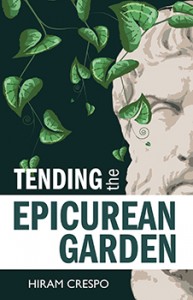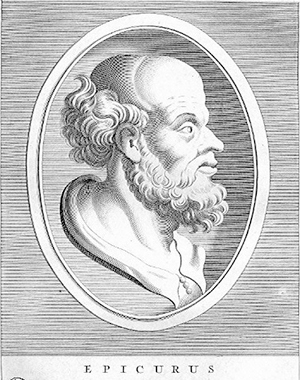Tending the Epicurean Garden

Ours is the age of science. We live in a time in which technology has performed such wondrous feats that many have come to believe, if only half consciously, that technology itself will exempt us from the human condition and save us from ourselves.
That is a dangerous delusion. As the psychiatrist-philosopher (and 1973 Humanist of the Year) Thomas Szasz realized,
In natural science, the task is to make new discoveries and to formulate novel theories, and to have the courage of propounding them in opposition to established knowledge; in moral science, it is to rediscover old observations and to rearticulate ancient principles and to have the courage to defend them in opposition to the pretensions of scientism.
Scientism is the false belief that science alone can enlighten and inform us. It is the belief that jet planes, iPhones, air conditioners, and medicines have freed us of natural constraints. It is a belief in science fiction, not science, and it is a fallacy. Secular humanists are especially vulnerable to its charms, but none of us is immune. According to the New York Times, in 2013 one in ten Americans was taking an antidepressant; among women in their 40s and 50s, it was one in four. If technology and drugs are doing anything for us, they do not seem to be making us obviously happier or freer than our grandparents were in their day-to-day lives.
And that brings me to this outstanding new book. Tending the Epicurean Garden is an exploration of the ancient philosophy of Epicurus and a primer on how you can apply it to your life. In it, Hiram Crespo distills academic work on Epicurean ethics, brings new perspectives to bear on them from other wisdom traditions, and demonstrates the philosophy’s continuing relevance to humankind. Crespo has rediscovered old observations and rearticulated ancient principles and has the courage to defend them in opposition to the pretensions of scientism. Everyone can benefit from reading this book.
We all know the names Plato and Aristotle. Few are familiar with Epicurus or the materialist philosophy that is named for him, even though he created the secular humanist lifestyle and endowed it with both scientific underpinnings and a coherent set of ethical principles. Epicurus (341-270 BCE) founded a school in Athens that he called “the Garden.” He sought to offer an alternative to both the speculative philosophy developed by Plato and the materialist-but-New-Agey philosophy of the Stoics, which insisted on the reality of fate and determinism. What’s more, he bequeathed humanity a set of beliefs and practices that can cure us of our fear of hell and that can teach us to be happy, ethical individuals in the here-and-now secular world.
The principal text of Epicureanism available to us today is Lucretius’ six-book poem On the Nature of Things. It is a masterpiece of Latin literature, but because its first few books are devoted to establishing the philosophy’s materialist physics, with extensive arguments seeking to prove atomic motion or sensory perception, many readers never make it to what really counts—its ethics. That is a shame because Epicurus is the progenitor of libertarianism, self-help, and, above all, of philosophy understood as psychotherapy. All who believe in free will, autonomy, and personal responsibility will be interested in what he had to say. I therefore applaud Crespo for choosing, unlike Lucretius, to emphasize Epicurean ethics and happiness over physics and epistemology. Because Crespo recognizes that the materialist basis of Epicurean philosophy is similar in spirit to the scientific worldview that most of us are taught in school today—we call quarks what Epicurus called atoms—it is only briefly and at the end of the book that he compares Epicurus’s understanding of physics with that of contemporary scientists and philosophers.
In a series of fifteen short chapters, Crespo introduces his belief that secular ethics can and should be cultivated—that post-religious people can and should realize that philosophy was once separate from religion and can become so again. He also shows how Epicureanism can improve your life by cultivating time-honored practices known to relieve anguish—meditation, journaling, memorizing catchphrases to recite during moments of anxiety, and learning to live in the moment.
Most chapters end with a series of tasks to help the reader introspect, and in only one case does the author contradict ancient doctrine. Epicurus is famous for demanding that his followers swear an oath of loyalty: “I will be faithful to Epicurus according towhom it has been my choice to live.” It is usually assumed that Epicurus required this ritual because he realized that orthodoxy, like his tetrapharmakon (four-part remedy), confers relief in times of anxiety. Crespo relaxes the oath by suggesting readers revise “Epicurus” to “Epicureanism” or that they simply ignore it. I should add that Epicurus also believed in the benefits of participating in groups bound by shared belief, perceiving (rightly) that humans are social creatures and thrive in company. (Incidentally, in keeping with that aim Crespo has founded a group in Chicago called the Society of the Friends of Epicurus.)
In addition to extending Epicurean physics by comparing it to contemporary physics, Tending the Epicurean Garden does a fine job of bringing other aspects of Epicureanism up to date. For example, Crespo compares Epicurean methods for attaining happiness with cutting-edge social science research out of Harvard and Princeton. More impressively, the book compares Epicurus’s conviction that man’s fear of death is the wellspring of all human anxiety with the work of Ernest Becker, the American anthropologist who reached an identical (and allegedly, independent) conclusion in the 1970s. I was particularly pleased to see Crespo synthesize and integrate practices and tenets of other wisdom traditions with Epicureanism. He gives special attention to Buddhism, which the American psychiatrist Ron Leifer (once a colleague of Becker’s and a student of Szasz) has sought to integrate into contemporary psychotherapy from the opposite direction.
Another point for which Crespo’s book deserves praise is his decision to avoid picking fights with religion. The fact that “epicurus” (apikoros) in Rabbinic Hebrew means “heretic, infidel” might suggest hostility is inevitable, but it is not; Epicurus actually advised his followers to participate in religious rituals. A distasteful feature of many contemporary secular humanist publications is the endless stream of post-religious authors stridently denouncing religion (usually their own from bygone days). They are the angry prophets of contemporary atheism. Following Epicurus’s example, Crespo instead quietly holds up Thomas Jefferson—a self-affirming Epicurean—as an ideal of how to incorporate the best parts of Christianity, such as the ethical precepts of Jesus, and he shows us how Epicureanism can prove to be an attractive and helpful philosophy even to religious people. Like Epicurus, Crespo understands that we humans are inherently religious animals. We need our religions—if not theological, then our political, social, moral, and economic religions. As long as fear of hell isn’t wrecking your life, Crespo is fine with it. Epicurus was the same.
Crespo thereby avoids making a second mistake frequently seen in secular humanist publications—namely, the assumption that the Democratic and Labour parties are the natural home of secular humanists. He simply avoids the issue. Like Epicurus, Crespo implies that we do best to avoid publicity in life, including taking part in political disputes.
In Tending the Epicurean Garden Crespo has given all of us a way to think about how we live—our choices, abilities, appetites, freedoms, and responsibilities. He distills the relevant scholarship on Epicureanism in a succinct and unassuming way. Only one question remains unresolved for me. It was courageous and commendable for Crespo to insist that proper diet, exercise, and moderation of our appetites are key to our happiness. He recognizes, as Epicurus did, that at the end of the day we alone decide what to ingest or inhale; those choices are our own. In candidly pinpointing self-control as a means of achieving happiness, Crespo puts himself squarely at odds with the dominant ethos of the medicalized society in which we now live. He doesn’t say whether kicking anti-depressants in favor of other approaches to finding happiness will help—whether the “pharmacratic” criticisms raised by Szasz, Schaler, Leifer, and others can be synthesized and integrated into his updated framework. That, I think, is the obvious next step for him and his companions as they embark on their mission to promote Epicureanism today. I will be watching the experiment with great interest.

